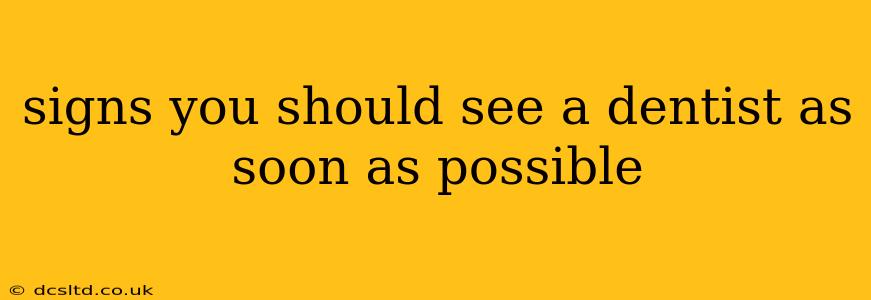Maintaining good oral hygiene is crucial for overall health, but sometimes, despite our best efforts, problems arise that require immediate professional attention. Ignoring dental issues can lead to more serious, costly, and painful complications down the line. This article outlines several warning signs that indicate you should schedule an appointment with your dentist as soon as possible. We'll also address some frequently asked questions surrounding dental emergencies.
Severe Toothache or Sensitivity
A persistent, throbbing toothache, especially one accompanied by swelling or fever, is a major red flag. This could indicate an abscess (a pus-filled pocket at the root of the tooth) or a severe infection, requiring immediate treatment to prevent further damage and potential spread of infection. Even increased sensitivity to hot or cold temperatures that doesn't improve with over-the-counter remedies should prompt a visit to the dentist.
Swollen Gums or Bleeding Gums
Swollen, red, and bleeding gums are classic symptoms of gingivitis, the early stage of gum disease (periodontitis). While gingivitis is often treatable with improved oral hygiene, neglected gum disease can lead to tooth loss. If you notice persistent swelling, bleeding, or pus around your gums, don't delay seeking professional care. Early intervention is key to preventing severe periodontal damage.
Broken or Chipped Tooth
A broken or chipped tooth, no matter how small, needs immediate attention. The exposed dentin (the layer beneath the enamel) is vulnerable to infection. Furthermore, sharp edges can irritate your tongue, cheek, or lip. Your dentist can assess the damage and recommend the appropriate repair, preventing further complications.
Loose or Missing Tooth
A loose tooth, particularly in an adult, is a cause for concern. This might indicate gum disease, an injury, or an underlying health problem. A missing tooth, aside from being aesthetically displeasing, can also affect your bite and jaw alignment. Your dentist can determine the cause of the looseness or missing tooth and provide the necessary treatment, whether it's a deep cleaning, restoration, or implant.
Persistent Bad Breath
While occasional bad breath is common, persistent halitosis (bad breath) that doesn't improve with brushing and flossing could signal an underlying oral health problem, such as gum disease, tooth decay, or a dry mouth. Your dentist can identify the source of the odor and recommend appropriate treatment.
Jaw Pain or Swelling
Pain or swelling in the jaw joint (temporomandibular joint or TMJ) can be caused by various factors, including bruxism (teeth grinding), arthritis, or injury. Ignoring TMJ problems can lead to chronic pain and potentially require more extensive treatment. Your dentist or a specialist can diagnose the cause and recommend appropriate treatment options.
What constitutes a dental emergency?
A dental emergency is typically defined as any severe pain, significant injury, or infection requiring immediate attention to prevent further complications. This includes severe toothaches, uncontrolled bleeding, knocked-out teeth, and significant facial swelling.
How can I prevent dental emergencies?
Practicing good oral hygiene – brushing twice daily, flossing regularly, and using a fluoride mouthwash – is the best way to prevent dental emergencies. Regular dental checkups and cleanings also play a vital role in early detection and prevention of dental problems. A healthy diet low in sugary foods and drinks is also beneficial for preventing tooth decay.
What should I do if I experience a dental emergency outside of office hours?
If you experience a dental emergency outside your dentist's office hours, contact your dentist or a 24-hour emergency dental service for guidance and treatment.
This information is for general knowledge and does not constitute medical advice. Always consult with a qualified dental professional for diagnosis and treatment of any dental concerns. Early intervention is crucial in preserving your oral health and preventing more serious issues. Don't delay; schedule an appointment with your dentist today!
